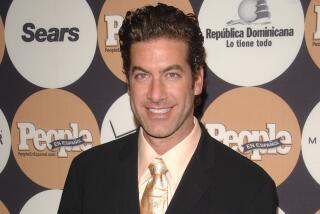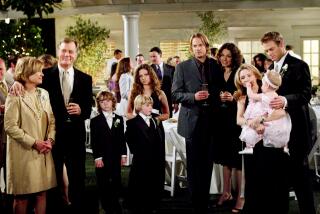New body, old temptations
At the age of 73, the ailing William Butler Yeats fired off one of his most memorable couplets: “You think it horrible that lust and rage / Should dance attendance upon my old age.” The Irish poet tried to shore up his crumbling physique and flagging libido with injections of powdered monkey glands. And at first, the narrator of Hanif Kureishi’s “The Body” seems like a candidate for a similar round of rejuvenation.
Not that Adam, a successful London playwright in his mid-60s, is on his deathbed. He’s experienced the predictable erosions of time -- the creaky joints and expanding waistline, the hemorrhoids and the cataracts -- and attempted to fight them with Yeatsian half-measures.
“I dyed my hair,” he recalls, “and even signed on at a gym.... It didn’t take me long to realize there are few things more risible than middle-aged narcissism. I knew the game was up when I had to wear my reading glasses in order to see the magazine I was masturbating over.”
No, it seems that Adam must go gently or cantankerously into that dark night. Or must he? One night a mysterious stranger approaches the narrator at a party. For a whopping fee, he will conduct Adam to a nearby clinic, where his brain will be transplanted into a fresh cadaver. This high-tech body shop -- a cross between a morgue and a Mercedes-Benz showroom -- is unknown, of course, to the general populace. But if Adam is willing to take the risk, he can emerge quite literally a new man. And there’s even a kind of warranty: For the first six months, he will be free to exchange this new model for his older, dingy, dilapidated one.
Adam takes the plunge. Selecting a refrigerated body “as classically handsome as any sculpture in the British Museum,” he awakens from the anesthesia in a state of hunky euphoria. The very sight of his splendid musculature in the mirror sends him into raptures. Yet he’s already intent on avoiding the narcissistic potholes: Neither beauty nor life itself “means much if you’re in a room on your own. Heaven is other people.” To heaven, then, he will go -- or least to the Continent, that traditional rumpus room for prudish Britons.
There, in a whirl of rough sex and designer pharmaceuticals, he immerses himself in the world of the senses: “I believed I was returning to something neglected: fundamental physical pleasure, the ecstasy of the body, of my skin, of movement, and of accelerated, spontaneous affection for others in the same state.” To some extent, he’s regained the perceptual equipment of a newborn (which, to some extent, he is). No wonder he lives for his appetites and for the “lucent, shivering pleasure” of satisfying them.
Even babies, however, must eventually come to grips with delayed gratification. Adam, too, concludes that desire isn’t all it’s cracked up to be: Without yearning, without denial, without even a coffee break, sex becomes boring. Indeed, he argues that “it is our pleasures, rather than our addictions and vices, that are our greatest problems.”
With this chastening thought in his brain -- the last vestige, let’s recall, of his original self -- he hits the road again. Soon he finds himself wandering the Greek islands, an innocent in search of answers. If you’ve ever wondered what Candide would look like in a thong, here’s your answer.
Yet Adam deliberately dials down his erotic voltage. He finds a job as a serene and celibate handyman at an Aegean New Age retreat. Having attained this sun-drenched Nirvana, he decides to reclaim his old physique, which now strikes him as “the sum total of my achievement made flesh.”
At this point, though, the novel takes a sharp turn for the worse. A team of snickering bad guys attempts to rob the hero of his body. There’s a villainous, kickboxing heavy on a yacht, a desperate escape and some ominous dialogue straight out of “Dr. No.” At once, Kureishi’s book undergoes a transformation even more dramatic than Adam’s: from philosophical novel to action movie.
Perhaps we shouldn’t be surprised. After all, the author originally studied philosophy at King’s College, and his previous six works of fiction have expertly mingled abstract ideas with grimy verisimilitude. At the same time, he’s written the screenplays for six movies (note the symmetry), including “My Beautiful Laundrette” and “London Kills Me.” So why shouldn’t he apply some cinematic torque to what is already a sci-fi premise and insert his own invasion of the body snatchers into the narrative?
The problem, however, is that certain transplants just don’t work, and this is one of them. The first half of “The Body” is such a smart, sexy meditation on body and soul -- think Rene Descartes with a dirty mind -- that the escapades in the second half feel downright pallid.
I’m not complaining: These days, with so much of literature being absorbed into the black hole of infotainment, it’s a paradoxical pleasure to find mind trumping matter so decisively in a work of fiction. On that front, certainly, “The Body” is a heartening work. As for the pistol play and the chase scenes -- well, I’ll look forward to the movie.
More to Read
The biggest entertainment stories
Get our big stories about Hollywood, film, television, music, arts, culture and more right in your inbox as soon as they publish.
You may occasionally receive promotional content from the Los Angeles Times.










